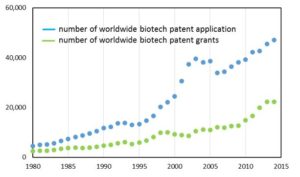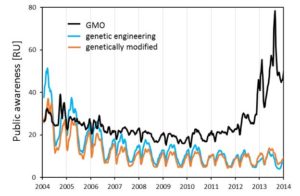27/07/2016
Public opinion on biotechnology and biotechnology patents is highly divided, and ranges from the fear of losing basic principles of our society to the unqualified support for scientific progress. Nevertheless, biotechnology is a growing market with total global revenues of over £220bn in 2014, which are predicted to reach almost £300bn by 20191. In contrast to medical biotechnology, which has been widely accepted, the application of green biotechnology is controversial. The ongoing debate coincides with a recent guide of the Royal Society2 aimed to educate the general public in GM crops and a recent study demonstrating that GM crops are safe to eat3).
This results in exciting times for the protection of IP in the field of biotechnology (Figure 1) and increased public awareness in the field (Figure 2):

Figure 1: Worldwide increase of biotechnology patent applications and grants
The number of granted biotechnology patents rose 15% per annum at the USPTO from 1990 to 2000, and 10.5% at the EPO, against a 5% per annum overall increase in patents. Since 2006, there has been a new wave of biotechnology patent applications. Further, the rate by which worldwide biotechnology patents were granted increased over the last decade and was particularly high between 2011 and 20134.

Figure 2: The public awareness of GMOs increased and searches for key search terms oscillated
The number of google searches for “GMO” increased since 2010, reaching almost 80 relative units (RU, indicating the relative popularity of that search term). The interest in “genetic engineering” and “genetically modified” oscillated in a seasonal manner and peaked in summer and in winter5.
Conclusions & Outlook
The increased IP protection in biotechnology is mirrored in the public awareness of genetically modified organisms (GMOs). Interestingly, the public interest in this field oscillated. These oscillations may correlate with farming and/or harvesting of crops which may be an explanation for the increased public awareness.
Based on the oscillating public awareness, biotechnology companies could derive strategies to promote the impact of patent publications during a period of maximum public awareness or schedule the publication to sneak through under the radar.
This article is for general information only. Its content is not a statement of the law on any subject and does not constitute advice. Please contact Reddie & Grose LLP for advice before taking any action in reliance on it.


